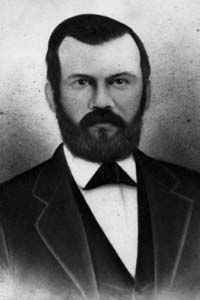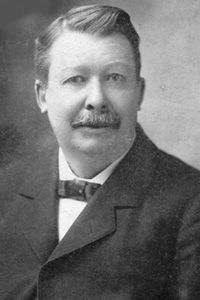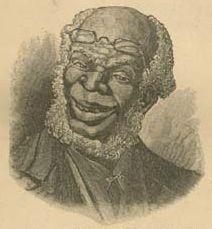Joseph Addison Turner (1826-1868), long-time writer and now editor of The Countryman, a newspaper published from Turner’s Putnam County, Georgia plantation–Turnwold–today affirms the Baptist & Banner newspaper’s recent addition of a literary department to the publication. In this same edition of his paper, Turner publishes an unusual story about the late Baptist giant John Leland, as recounted by an acquaintance of Leland’s (Leland’s exploits remain vivid enough that although he died in 1841, newspapers religious and secular, small and prominent, North and South, publish stories about the evangelist and church state separation advocate throughout the remainder of the nineteenth century).
Turner–born in Putnam County, raised on the family’s Turnwold plantation, and now an active Methodist layman–often publishes religiously-themed articles in his newspaper, the only known newspaper published on a plantation during the war. Turnwold Plantation contains Turner’s vast personal library, providing much material for his paper. A staunch and vocal advocate of African slavery and the Confederacy, Turner’s Countryman, published from March 1862 until May 1866 (with a brief interruption in the summer of 1865 when Turner is placed under arrest by the United States government), is one of the more popular newspapers in the Confederacy throughout the war.
Turner, however, is lesser-remembered than is his apprentice and typesetter, Joel Chandler Harris (1845-1908). A young aspiring writer, Harris learns the newspaper craft “at Turner’s elbow” and is granted, with Turner’s help, a draft exemption in order that he might continue writing for the Southern cause. Harris reads widely in the plantation library, writes poetry and book reviews for the Countryman, and spends many hours listening to Turner’s African slaves tell stories; among the storytellers are Uncle George Terrell, Old Harbert, and Aunt Crissy, who after the war become models for Uncle Remus, Aunt Tempy, and other characters in the African American tales Harris publishes.
Meanwhile, today, Turner–after commenting on the Banner & Baptist–offers his thoughts on religious literature of the South.
The best way to build up the literature of the South, in my estimation, is to graft it upon religious and secular papers which already have standing and circulation, instead of trying to create new papers exclusively literary. The European and yankee journals give us good illustration of this. The London, Paris and N. York newspapers are many of them not exclusively political journals, but contain well digested articles on literature and miscellaneous subjects. Why cannot Confederate newspaper imitate them in this respect?
Like Turner, many Southern elites take pride in the literary accomplishments of their region’s intellectuals. Turner takes his own admonitions to heart, as his newspaper is widely admired for its literary quality. The post-war years, however, bring economic, mental and physical hardship upon Turner and Turnwold, and the newspaperman dies in 1868 at the young age of forty-one. Ironically, Turnwold’s legacy is carried on by Harris, whose literary fame is credited to the storytelling of African slaves who, prior to the end of the war, were legally forbidden to either read or write.
Sources: “The Banner & Baptist” and “A Haunted Preacher,” The Countryman, October 13, 1862, pp. 18, 23 (link); “Joseph Addison Turner,” Georgia Encyclopedia (link); “Joel Chandler Harris,” Georgia Encyclopedia (link); Philadelphia United Methodist Church Historical Marker (link); Uncle Remus image (link)





